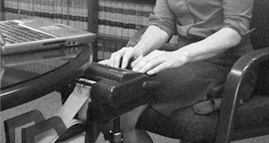The Jury Is Watching: How to Lose a Trial by Jaywalking and Other Bad Behavior
May 19, 2012 by David Newdorf
Filed under Lit Tip Of The Week:™ Practical Advice For Litigators
The star of one of my favorite trial stories isn’t a lawyer.
The star of this story is my wife, Shoey Sindel, a Berkeley wedding and portrait photographer. She was seated on a jury in a personal injury case. The case was tough for plaintiff, who admitted to being drunk and jaywalking when a motorist hit him on a dark street at night. Liability wasn’t the only tough sell. Damages were iffy because plaintiff had been unemployed for several years.
Plaintiff’s counsel played the sympathy card, hoping that a showing of pain and suffering would sway the jury. When the plaintiff took the stand, he walked tentatively, leaning on a cane. He grimaced with each step. Either the plaintiff was in a lot of pain or he was a good actor.
The next morning, as my wife was driving to the courthouse, who do you suppose she saw running across the street, jaywalking and holding a cane like he was going to hand it off in an Olympic relay race? That’s right. The plaintiff.
Plaintiff did not appear to be in pain or suffering from any injuries. Shoey sat through the morning testimony until a break. She pondered what to do. Wait until jury deliberations and tell the jury what she saw? She expected that would lead to a swift verdict against this shifty plaintiff. She decided to tell the bailiff she needed to talk to the judge. The judge along with the attorneys met with Shoey in chambers. Shoey told the judge what she had seen that morning and that she couldn’t be an impartial juror. That was true. Shoey had become the star witness for the defense. Defendant would be entitled to call her as a witness to impeach plaintiff’s claims of pain, suffering and injury.
The judge had no alternative. He declared a mistrial. The matter settled, and Shoey never had to testify as to what she saw.
Lesson for Lawyers: You Are Always On Stage
There is an important lesson here for lawyers and their clients during jury trials. The jury is scrutinizing you at all times, not just when you are on the stand or at the lectern. Late to court? Don’t cut off that car in the parking lot or cut to the head of the line at the courthouse entrance. That’s right — the jurors are watching.
Taking a break in the hall? Not the best place to share a joke and laugh with your client. Mirth may not convey the message you would choose as to the seriousness of the trial proceedings.
Sitting at counsel’s table when the other side’s witness has just delivered a surprise zinger? Now’s not the time to jump up straight in your chair, start scribbling notes furiously or lean over to whisper to each other with an agitated expression. Such a sudden burst of activity is the best way to signal the jury to pay attention to damaging testimony. Best reaction? A yawn. Trials are long and boring. At any one time, most jurors are drifting or daydreaming. No need to break the reverie when you’d rather they kept snoozing.
Prepare your clients and witnesses as to courtroom etiquette before trial. They are to conduct themselves politely and with proper decorum from the time they get near the courthouse until the they have left the neighborhood at the end of the day. You can’t speak with jurors, but you can be polite. Hold the elevator or door. Let the juror go first.
The jawywalking plaintiff with his phony injuries is an extreme example. Most lapses of decorum won’t lead to a mistrial. Just remember — the jurors are watching.
About California Litigation Firm Newdorf Legal
David Newdorf is managing attorney of Newdorf Legal, which represents individuals, businesses and public entities in trials and appeals. The firm’s practice areas include business disputes, business torts/interference with contract, breach of contract, breach of fiduciary duty, fraud, investment disputes, real estate, commercial landlord-tenant cases, and municipal law.
Mr. Newdorf worked previously as a trial lawyer and team leader in the San Francisco City Attorney’s Office and was a litigation associate at a major international law firm. Mr. Newdorf was recently listed, for the second year in a row, in Northern California Super Lawyers magazine, an honor reserved for 5 percent of the State’s lawyers based on nomination by fellow lawyers and evaluation of professional reputation and achievement. In a more unusual accolade, Mr. Newdorf was named “Badass lawyer of the week” by The Recorder’s blog, LegalPad.
For all of your litigation questions, contact Newdorf Legal, a San Francisco business litigation law firm.
Preparing Your Client For Deposition
December 2, 2007 by David Newdorf
Filed under Lit Tip Of The Week:™ Practical Advice For Litigators
Preparing your client to testify at deposition can make or break a lawsuit.
Defending your client’s deposition can be a nerve-wracking, sweaty armpit experience.At the end of the day, a weak performance or just one poor answer can sink a case. But even with stakes this high, most lawyers do not spend enough time preparing the client to testify. While the demands of your practice, your client’s calendar, or the legal budget for the case may not allow it, ideally you should spend at least two hours of preparation with the client for each anticipated hour of deposition. And sending your client home with a stack of documents to review is no substitute for the face-to-face prep session.

Here is a basic outline and some tips for your deposition preparation session with your client.
- Start with the basic procedure. Let the client know the who, what, when and where of the deposition. Who will be present? Explain the role of the court reporter. Tell the client whether the deposition will be videotaped. Explain the oath. Go over the Q & A format. Explain that you may be stating objections for the record, but that the client will have to answer the question except in the rare cases when you instruct him or her not to answer. If this is the witness’s first depo, he or she will appreciate learning about the basics. The client will likely have some anxiety and letting hime or her know what to expect will lessen the unease.
- Give a sample admonishment. Come deposition day, it is likely that the lawyer who noticed the depo will start with a standard list of “ground rules.” Explain these and let your client hear a sample admonishment during the prep session. When the client hears these same standard instructions from the opposing lawyer at the beginning of the actual deposition, she or he will think “I’m prepared for this.” That will calm any jitters and allow the client to focus on what’s important. Don’t forget to ask your client during prep about medication he or she takes. Medical conditions can be a sensitive issue, and if your client is taking prescription medication, you don’t want to the client to be surprised and embarrassed by this common question.
- Explain how the deposition fits into the end goal of “winning.” Remember: the deposition is opposing counsel’s opportunity to learn about your case. If he doesn’t do a good job, is that our problem? Of course not. At the deposition of our clients, our strategy is defensive. I often use the analogy that the depo is like a game of “20 Questions.” If the questioner doesn’t ask the right questions, he loses. But the first instinct of the client — especially if this is her first encounter with the other side — may be to attempt to: (1) persuade the other side; (2) charm the other side; (3) argue with the other side; or (4) tell her entire story. It is your job in prepping the client to get her to resist any of these common traps. Cases are not won at the client’s depo, but they can be lost. Let the client know that this isn’t the time to “tell her story.” There will be other opportunities — including arbitration, mediation or trial.
- Keep answers short. The best deposition answers — from the point-of-view of the defending side of the table — are the shortest, truthful answers. Tell your client: Don’t explain. Don’t speculate. Don’t help the opposing counsel. Explain the difference between a “guess” and an “estimate.” I use the example of the conference table: “You may not know the exact dimensions of the table in this room, but you could give an estimate. But if I asked you ‘How big is the conference table on the floor below?’ — your answer would be a guess because you’ve never been in that conference room.” (If anyone one has another favorite example, let me know. I’m always looking for fresh material.)
- The best deposition answers are the ones that answer the question directly and briefly. For example, the proper answer to the question: “Do you know what time it is?” is either “Yes” or “No” — but not “10 a.m.” Why? Because the latter answer volunteered information that was not called for by the question — a basic depo mistake. Your client may protest that the deposition will take longer that way. No one wants to spend any longer than necessary in a depo, and your client may think: “I have nothing to hide. If I just tell the lawyer everything I know, we can all get out of here sooner.” Wrong! Every volunteered tid-bit will be written down by the opposing counsel and lead to another line of questioning. Though counter intuitive to most clients, you must emphasize that shorter answers lead to shorter, better depos.
- The “perfect” answers. I tell clients that the only “perfect” depo answers (if they are truthful ones) are the following:
- “Yes.”
- “No.”
- “I don’t know.”
- “I don’t recall.”
- “Can you rephrase your question?”
As for the last answer — “please rephrase” — tell the client to never answer a question he doesn’t understand. It’s the questioner’s job to ask understandable questions, and it’s dangerous to answer a question if one doesn’t know what it means. Explain the difference between “I don’t know” and “I don’t recall.” Some witnesses will overuse these two answers because they are easy. That mistake will come come back to haunt you at trial when the client’s memory and knowledge has been miraculously restored.
- Review important documents and all prior statements. During prep, you and your client should go over all of the witness’s own prior taped or written statements on the subject of the lawsuit. Deposition testimony that is inconsistent with prior statements can lead to uncomfortable cross-examination at trial. And in prepping for the depo, don’t just give your client a stack of documents to review in his office or at home. Having the client read them on his own — if he actually does it — is better than nothing, but not much. You need to read and discuss the important documents with your client.
- Practice Q & A. This is useful and should be done. But if you anticipate that your client will be vigorously cross-examined at depo, get another lawyer to deliver the tough practice grilling. For example, O.J. Simpson’s dream team — not lacking in cross-examination skills — brought in Berkeley criminal defense maven Cris Arguedas to do the deed. Why? Because being subjected to cross-examination isn’t fun. Even knowing that this is “practice” and you’re really on his side, your client could easily resent getting the third-degree from his own lawyer.
- Don’t forget to review the “Top 10 Killer Deposition Questions” with your client. Read my list of “killer” deposition questions in last week’s Lit Tip Of The Week. And prepare for other expected tough questions.
- Videotaped depositions. If you know the deposition will be videotaped, tell your client. Instruct your client to dress in trial attire. For men, that usually means suit or jacket and tie. For women, a dress suit. If your client has any distracting mannerisms (such as resting chin on hand or not looking at the questioner), tell her what they are and to resist them while on camera. Also, if the depo will be videotaped, warn your client not to turn and look at you before answering. This gesture makes the witness look like she is looking to her lawyer to tell her what to say.
Know your case before deposition prep
Every case is different, so consider these rules as guidelines. If you have a good reason to deviate from these suggestions — go ahead. But you should at least know and understand the conventional wisdom before altering it.
About Newdorf Legal – a California
Business Litigation Law Firm
Newdorf Legal is the go-to small firm for big problems. When business executives and public officials face complex legal challenges, they turn to David Newdorf for advice and representation. The firm’s lawyers have significant experience in the private and public sectors handling high-profile litigation. Newdorf Legal provides business and public entity clients expert advice and representation in:
- business litigation
- commercial disputes
- California breach of contract lawsuits
- business torts/interference with contract
- real property litigation
- joint venture/partnership issues
- investor lawsuits
- fraud and other civil actions
For a free copy of our informative brochure, “The Top 10 Business Litigation Mistakes . . . and how to avoid them,” contact Newdorf Legal.
For all of your litigation questions, contact Newdorf Legal, a San Francisco business litigation law firm.









